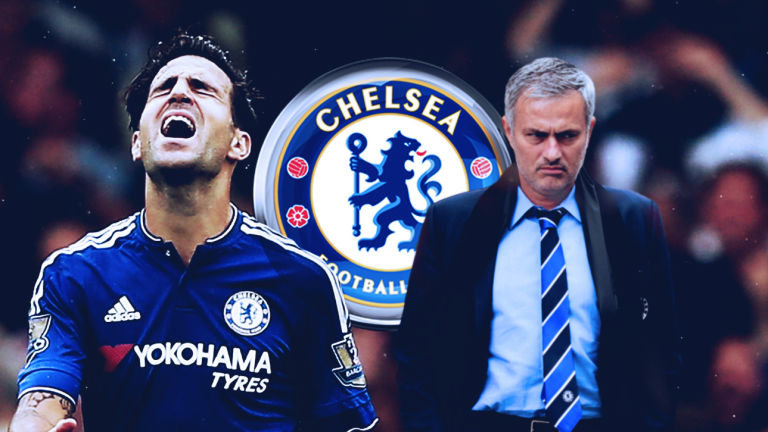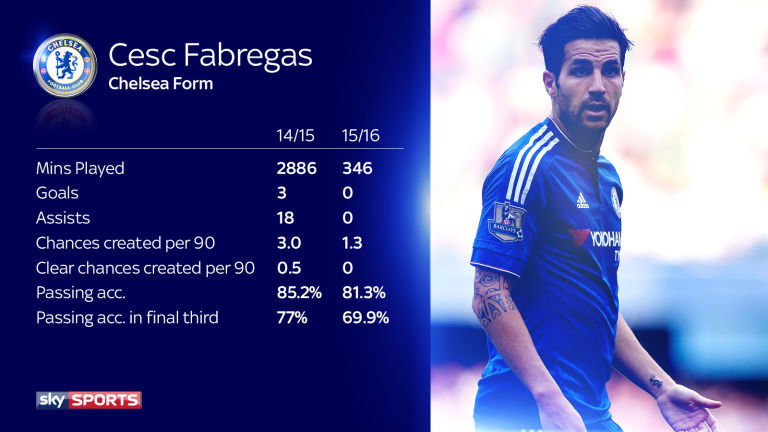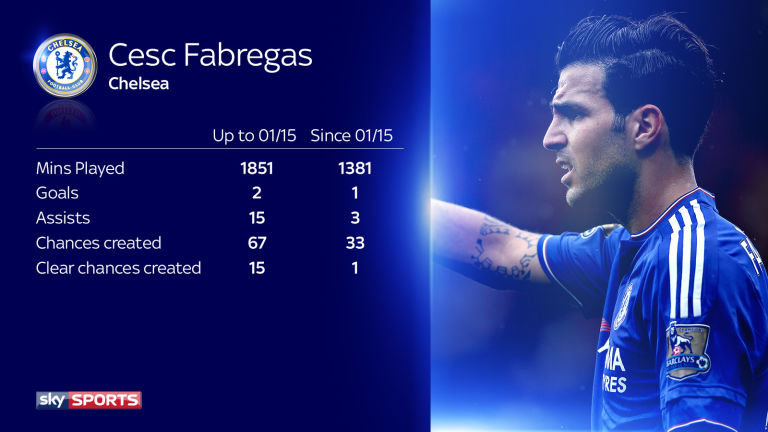
With
Cesc Fabregas enduring a difficult start to the season with Chelsea, Adam
Bate examines the numbers that highlight his struggles…
During
Monday Night Football, Gary Neville accused Arsenal's
midfield of "not being powerful enough" for more than a decade. Chelsea
fans, and maybe even Nemanja Matic, could be forgiven if thoughts had turned
closer to home long before Thierry Henry explained that the emergence of
Cesc Fabregas had sparked Arsene Wenger's shift in approach.
It's been a tough beginning to the Premier League season for Fabregas.
Chelsea's start to their Premier League title defence has been woeful and
few can claim to be free from blame. But the speed with which the Spaniard
was exposed in the 3-0 defeat against Manchester City last month would have
given Usain Bolt a run for his money.
Fabregas is a fantastic footballer, he creates goals, he scores goals. But
he can't defend. He lacks tactical intelligence, especially defensively.
These defensive frailties are well documented. Pep Guardiola baulked at
moulding Fabregas as Xavi's successor because of them. "The demands of a
Barca midfielder require a lot of discipline and a tactical approach," said
Sky Sports Spanish football expert Guillem Balague. "Guardiola tried to
convince him for a long time what he had to do, but couldn't fully."
Indeed, this was one of the great ironies of Fabregas's unlikely union with
Jose Mourinho. The Portuguese pragmatist had embraced the playmaker in the
deeper role that Guardiola was unwilling to entrust to him. It reaped
dividends from the outset as Fabregas provided Chelsea with the creative
spark that saw Mourinho's men lead from the front last season.
But that trade off was always there. In fact, despite winning them all,
Chelsea conceded six goals in their first four games last season. This might
be their worst defensive start to a season since 1971, but that's not the
biggest change from a year ago. It's the first part of Carragher's deal that
Fabregas is no longer fulfilling. Where are those goals and assists?
Fabregas actually found the net only three times in the Premier League last
season. But his tally of 18 assists, including an astonishing six from the
first four games, was more than any other player in the country. His
creativity unlocked many a defence and elevated Chelsea's midfield play from
the functional to the fabulous.

Of
course, any midfielder is at the mercy of his strikers when it comes to
assists. But in this instance, further examination would suggest that the
chances for Diego Costa and the rest are drying up. Fabregas averaged 3.0
chances created per 90 minutes in 2014/15 but his first four matches of the
current campaign have yielded only five such chances.
The quality of the openings being fashioned are also down dramatically on
last year. Opta defines a big chance as one that a player might reasonably
be expected to score - a one-on-one or a close range opportunity. Fabregas
provided 16 of them last season but Mourinho is still waiting for his
creator-in-chief to deliver one such chance for his side this year.
It's not that he's been playing safer either - eschewing the high-risk pass
in favour of retaining possession. Fabregas' pass completion numbers are
down from 85.2 per cent last season to 81.3 per cent in 2015/16. For passes
into the final third, the contrast is even more marked - down from 77.0 per
cent to just 69.9 per cent. The ball is just not getting through.
These problems are being felt throughout the Chelsea team. While the
struggles of the Matic-Fabregas partnership have left individuals within the
back-four exposed, there are also consequences further forwards too. Costa
is already six goals down on his total at the same stage last season, while
the supply lines to Eden Hazard have broken down.
"My mission has been to make passes between the lines to the likes of
Hazard, Willian and Oscar and make them click," Fabregas told Sky Sports
earlier this year. But it's not happening and his difficulties lend a fresh
- and worrying - perspective to Fabregas's deteriorating form during the
second half of last season too.
That was explained away as a familiar trend. After all, Fabregas has a
career-long habit of suffering a dip after Christmas. But this slow start
means the midfielder's performances have been below par for seven months and
counting. In Chelsea blue, he's effectively been underwhelming now for
longer than he was spectacular.
Re-examine those numbers. In 1851 Premier League minutes up to the end of
January, Fabregas fashioned 15 big chances for his team-mates and provided
the same number of assists for Chelsea goals. In the 1381 Premier League
minutes since - more than 23 hours of football - he's bagged three assists
and provided only one clear-cut opening for a colleague.

No
wonder Mourinho is unimpressed. Fabregas was one of seven players with whom
the Chelsea boss was "not happy" following the defeat to Manchester City
and, by a process of elimination, he finds himself on the shortlist of
players that Mourinho openly wished he could've been permitted a fourth
substitute in order to remove against Crystal Palace.
"We could clearly identify two or three players that can do better," he
added after that defeat, only his second in 100 Premier League games at
Stamford Bridge. "That is what we have to do. It is not about being loyal or
not. It is whether they are ready to give an answer and fight against that
bad form."
Coming up with the solution is the challenge now facing Mourinho and history
would suggest his response will be to tighten things up - perhaps switching
to two genuine holding midfield players. That could be good news for Ruben
Loftus-Cheek but a problem for Fabregas, who might find himself thrust into
an advanced role once more.
It's a position that limits his - and Chelsea's - options. For while
Fabregas has the technique to play on the half-turn, he's at his most
effective when joining the attacks from deep and providing that extra man.
Further forwards he becomes more dependent upon precisely the quality of
service that only he among Chelsea's midfield is capable of providing.
Shifting Fabregas up the pitch would only increase the pressure to come up
with the sort of end product that's been so sorely lacking. The signs aren't
good. And so, extraordinarily, the player who so epitomised the early season
swagger of Chelsea's title stroll could yet become a high-profile victim of
their stuttering start to the defence of that crown.
 top
top top
top With
Cesc Fabregas enduring a difficult start to the season with Chelsea, Adam
Bate examines the numbers that highlight his struggles…
With
Cesc Fabregas enduring a difficult start to the season with Chelsea, Adam
Bate examines the numbers that highlight his struggles… Of
course, any midfielder is at the mercy of his strikers when it comes to
assists. But in this instance, further examination would suggest that the
chances for Diego Costa and the rest are drying up. Fabregas averaged 3.0
chances created per 90 minutes in 2014/15 but his first four matches of the
current campaign have yielded only five such chances.
Of
course, any midfielder is at the mercy of his strikers when it comes to
assists. But in this instance, further examination would suggest that the
chances for Diego Costa and the rest are drying up. Fabregas averaged 3.0
chances created per 90 minutes in 2014/15 but his first four matches of the
current campaign have yielded only five such chances. No
wonder Mourinho is unimpressed. Fabregas was one of seven players with whom
the Chelsea boss was "not happy" following the defeat to Manchester City
and, by a process of elimination, he finds himself on the shortlist of
players that Mourinho openly wished he could've been permitted a fourth
substitute in order to remove against Crystal Palace.
No
wonder Mourinho is unimpressed. Fabregas was one of seven players with whom
the Chelsea boss was "not happy" following the defeat to Manchester City
and, by a process of elimination, he finds himself on the shortlist of
players that Mourinho openly wished he could've been permitted a fourth
substitute in order to remove against Crystal Palace.